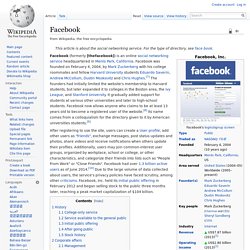

How to Update Your Facebook Privacy Settings" Privacy is one of the biggest challenges on social networking Web sites.

Besides putting users at risk, the company behind a site jeopardizes its reputation if it doesn't make privacy a priority. Social network giant Facebook knows that hazard well. Since its launch, Facebook has been a target for criticism regarding its open approach to user privacy, especially its decision to share rather than hide your personal information by default. Fortunately, Facebook has provided privacy settings to keep your personal information safe. Before we dive in to those settings, let's take a look at some privacy vulnerabilities you need to be aware of as a Facebook user. By default, your status, photos, posts and bio can be viewed by everyone. Facebook Reaches Privacy Settlement With FTC. Protect Your Privacy on Facebook and Twitter. Web surfing is no longer a solo affair.

Facebook, Twitter, and other social networks have quickly become an integral part of the online culture, and with them comes a whole new array of potential security threats. In this article, I'll identify some of the key dangers of social networking and offer a few easy steps that you can take to stay safe online. Social networking is built on the idea of sharing information openly and fostering a sense of community. Unfortunately, an online network of individuals actively sharing their experiences and seeking connections with other like-minded people can be easy prey for hackers bent on social-engineering and phishing attacks.
It's important to be aware of the threats, and to maintain a healthy skepticism in your online interactions. Be Careful What You Share For starters, even in an open community of sharing, you should observe some boundaries. Remember Who Your Friends Are Friends of Friends May See Your Post So, you've thought it through. Facebook. This article is about the social networking service.

For the type of directory, see face book. Facebook (formerly [thefacebook]) is an online social networking service headquartered in Menlo Park, California. Facebook was founded on February 4, 2004, by Mark Zuckerberg with his college roommates and fellow Harvard University students Eduardo Saverin, Andrew McCollum, Dustin Moskovitz and Chris Hughes.[7] The founders had initially limited the website's membership to Harvard students, but later expanded it to colleges in the Boston area, the Ivy League, and Stanford University.
It gradually added support for students at various other universities and later to high-school students. Facebook now allows anyone who claims to be at least 13 years old to become a registered user of the website.[8] Its name comes from a colloquialism for the directory given to it by American universities students.[9] History College-only service Service available to the general public Initial public offering. Despite Facebook, privacy is far from dead. Amitai Etzioni says Facebook chief executive Mark Zuckerberg says privacy is obsolete, but has made concessions on the issue. Critics say the rise of Facebook coincides with the death of privacyAmitai Etzioni says privacy is better protected now than in earlier erasHe says documents are encrypted, and laws prohibit invading medical privacyEtzioni: Those who use Facebook should be aware of the privacy they're surrendering Editor's note: Amitai Etzioni is professor of international relations and director of the Institute for Communitarian Policy Studies at George Washington University.
He is the author of "The Limits of Privacy. " Washington (CNN) -- Whatever the outcome of Facebook's public offering of stock, the social network has already enriched quite a few — as well as famously offered many hundreds of millions of people a new virtual social world. Yet critics claim that Facebook is hastening the demise of privacy, which as the cliché goes, is already on life support. Amitai Etzioni.